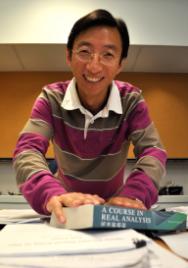Researcher aims for super efficient cyber world
Published on 09 September, 2010
For a man who loves reading math history books in his spare time, it is no wonder numbers play an important part in his job...
Li Chai is a new research fellow at CQUniversity who is researching multirate signal processing, networked control and wireless sensor networks.

Compressing data is vital to Li Chai's cyber world research.To most of us this may mean very little, but this research is vital to enhancing our modern cyber world.
Multirate signal processing enables our digital photos and video snippets we store and share to be compressed in common formats such as a JPEG or MPEG4.
"My research focuses on providing high quality and efficient compressing methods for images and video," Li said.
Compressing these sorts of files is vital to enable high speed distribution and trouble-free storage.
Li said he hopes his research into wireless sensor networks will also contribute to a more efficient online world.
"Imagine the difficulty of finding and fixing one or two damaged cables among hundreds of cables. In a wireless scenario, it is very easy to solve such problems," Li explained.
"The use of wireless technology provides many opportunities and challenges to industrial networked control systems. One main benefit is the reduction of cost and time for the installation and maintenance of expensive cables, which usually work on harsh industrial environments.
"However, the current personal wireless communication technology can not satisfy the requirement of industrial applications on high reliability, real-time transmission and security etc. We are working on new theory for (wireless) networked control systems," Li said.
Li received his undergraduate degree in applied mathematics followed by his Masters in control science and engineering from Zhejiang University.
He later completed his PhD in electrical engineering from Hong Kong University of Science and technology.
He has since worked at Hangzhou Dianzi University in China, Monash University here in Australia and Wuhan University of Science and Technology in China.

